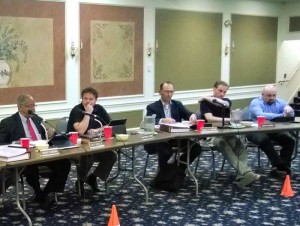Distaste for government overreaching trumps desire to protect architectural heritage
By Rick Marts, Correspondent, The Times

Kenntt Square Council member Dan Maffei (center) gave a passionate defense of a proposed Borough ordinance to redraw the Historic District and create a Historic Architectural Review Board, but the new legislation was defeated by his colleagues on the council, by a 4-3 vote.
KENNETT – Most of Monday evening’s Kennett Square Borough Council public meeting was taken up with discussion of proposed Act 167, an ordinance to create a new historic district within the Borough and a Historic Architecture Review Board (HARB) to rule on amendments to buildings and structures deemed to have historic significance.
Creating the new district and the proposed board was defeated by a four to three vote of the seven Council members.
In short, the legislation’s purpose was to protect the Borough’s historic resources and promote them in a way that would reflect the Borough’s cultural, economic, social, political, and architectural history; improve property values; and strengthen interest in our historic past.
Council member Dan Maffei introduced the proposed legislation by summarizing its purposes, highlights, and major requirements. He said, “The new criteria for amending historic structures are really less stringent than our current laws.”
Maffei also described the differences between what would be the Borough’s new zone A and B in its historic district. For example, he said, “In zone A, which encompasses the existing R district plus 16 other properties, the HARB would review the entire property. In zone B, however, only the façade of the building and outbuildings would be reviewed.”
After Maffei’s introduction, Council President Spencer invited the public to the podium to comment on the proposed legislation.
One commenter suggested that the redistricting was capricious and did not make sense to have more than one district or zone.
Another was concerned that, while requiring preservation when remodeling a historic home was commendable, it also could be expensive for the homeowner. She acknowledged the legislation’s hardship clause would provide assistance, but she questioned the propriety of the HARB delving into someone’s personal finances to establish hardship. She also questioned whether the HARB might require someone to invest more in their property than it is worth.
Another commenter thanked the Council for keeping the public informed and said he supported the new legislation because it is in the best interest of Kennett Square.
Ann Einstein, who owns a property at 119 East Linden St. and to whom the Council presented and award two weeks ago for best renovation in 2013, said, “At times, we are compared to West Chester, and this is inappropriate because we have no university in our borough and we are not a county seat, all of which increases West Chester’s property values.” She also said, “This proposed legislation is government overreach, and property owners should be trusted to do what’s best for their properties.”
On the other hand, another commenter voiced support for the proposed ordinance and said she did not believe it was an overreach.
Without further comments from the public, a motion was made and seconded to adopt the new ordinance; it was followed by a brief discussion.
Maffei rose again to point out that, “Some of the people who live in our historic district are some of our most vulnerable residents. A would-be profiteer might buy several houses and gentrify [presumably at less than the standards that would be set by the proposed HARB] them for wealthy buyers, driving out the current owners and reducing the diversity of our population.”
Council President Leon Spencer called for a vote, which resulted in the defeat of the proposed legislation.
The next action item on the Council’s agenda was to consider and vote on a new ordinance implementing the Fair Housing Act, Municipal Code Chapters 3 and 11. The Council and public learned that PA’s Fair Housing Rights Center asked the Borough to make some changes to its implementing language to accommodate emotional support animals, companions that provide therapeutic benefits.
A motion was made to adopt the new ordinance as amended; it was seconded, and approved by a unanimous vote without further discussion.
In other business, Police Chief Zunino had good news: the number of calls his office handles are declining for month over month and year over year. April 2013 calls were 663 compared to this April’s calls at 585. And calls for 2013 year-to-date were 2,610 compared to 2014 year-to-date of 2,414.
A few weeks ago, several residents complained during the public comment period about chickens roaming willy-nilly in one of Kennett Square’s residential neighborhoods. John Thomas of the Borough may have hit on the reason for this behavior as he addressed Borough Council on Monday night. He said, “The problem with chickens is that you can’t tell a chicken what to do.”
That might have summed it up, but Thomas constructively went on to say, “Chickens are dirty and they destroy plants. And they pass on salmonella. Chickens need space to run, peck, and hunt for food. If you allow chickens, there are many safeguards that are needed, like licenses for owners and inspections of the birds themselves.”




